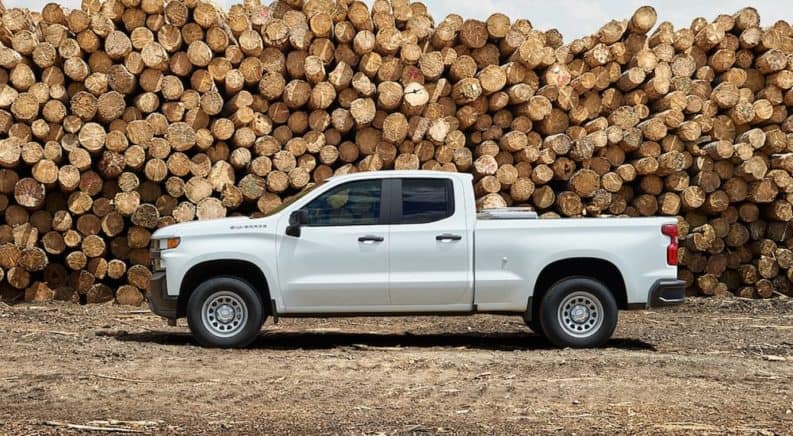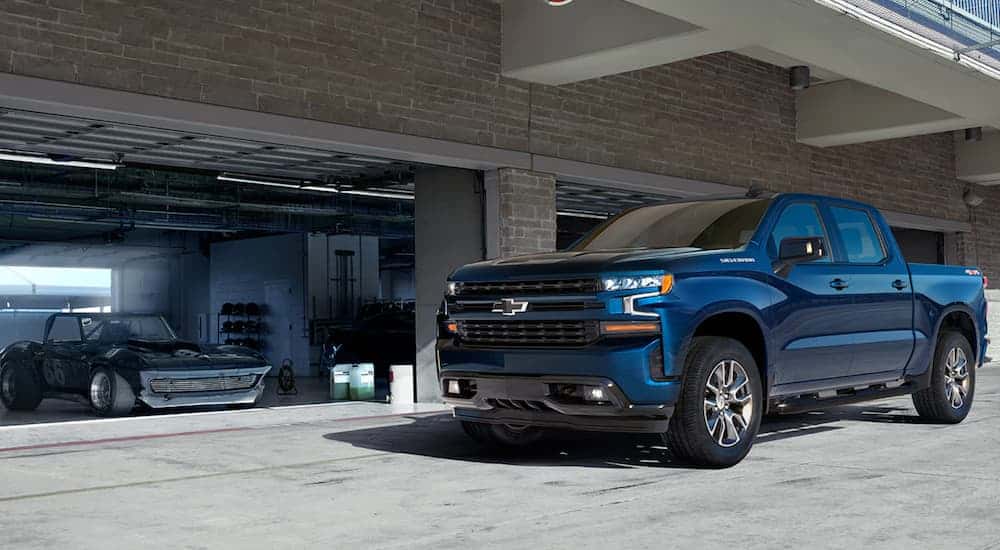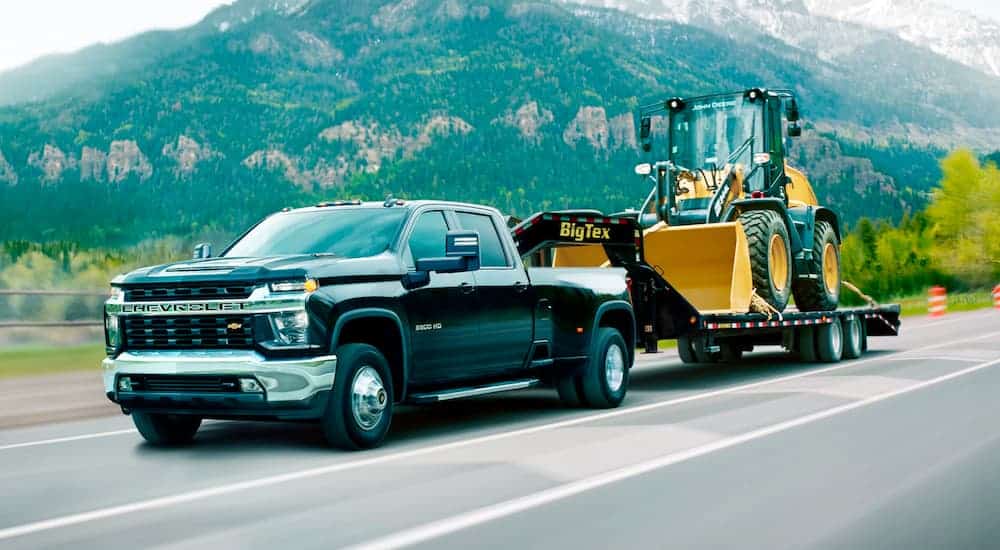America’s obsession with diesel pickup trucks shows no signs of slowing down, and with good reason. These rugged, go-anywhere rigs easily perform at the job site or when you and the family are heading down the highway for another RV adventure. They often tow more, provide better fuel economy, and cost less to own. Who wouldn’t want diesel power? Whether you’re visiting a Chevy diesel truck dealer in Norfolk or Nashville, the demand for diesel-powered trucks is everywhere.
A diesel engine promises big-time reliability – that’s always been the case – but today’s diesel motors also deliver exceptional performance. That’s due to recent technological advances in diesel engine technology. Gone are the days of ‘dirty diesel’ when acceleration meant belching sooty clouds of black smoke out of the exhaust. Diesel is more environmentally-friendly than ever, and because diesel fuel burns more efficiently, the result is a more efficient motor that delivers surprising fuel efficiency.
If you’re looking to buy a diesel-powered truck, our handy performance guide will steer you in the right direction. We’ll cover the ins and outs of how diesel power works, how it differs from a traditional gas motor, and what you can expect for performance, specifically towing/payload capacity and torque. Read on for our tips on diesel trucks.
How Diesel Engines Work And Why They Perform Better
Most engines, including diesel engines, work via internal combustion – burning fuel – which provides the energy to move pistons and distribute power to the vehicle’s wheels. Specifically, a mixture of fuel and air is ignited inside the engine pistons, which moves the pistons and creates power. However, not all internal combustion engines are the same. While gasoline engines use sparkplugs to ignite the fuel and air mixture inside their cylinders, diesel engines simply compress the mixture until it reaches a temperature where it combusts. The process involves forcing the air and fuel into a smaller space, which can heat the mixture to 1,000 degrees or more.
The benefits of a diesel engine include superior fuel efficiency, less maintenance, and greater dependability. It’s not uncommon for a diesel engine to last for 300,000 or more miles. Its cycle is simply more efficient and works with fewer parts than a gas engine. The higher air compression achieved by a diesel engine’s components is superior to that of a gas engine, specifically because of the gas engine’s dependency on spark plugs to ignite the fuel and the larger quantity of fuel required to complete the ignition cycle.
Historically, diesel engines took more time to warm up in very cold weather. Today’s diesel engines correct for that with glow plugs. These heating devices help accelerate the warming-up process that’s necessary to superheat air and get the engine moving. Glow plugs can typically last for around 100,000 miles.
Diesel fuel is perhaps a little dirtier than the more highly refined gasoline. While this may seem impractical when considering the environment and pollution, diesel engines actually use less fuel, so a gallon of diesel fuel lasts longer than a gallon of gas, making it essentially a trade-off. Also, research is inconclusive about whether diesel fuel actually burns dirtier than gas, with some studies suggesting it’s about the same for both. In addition, automakers are constantly looking for ways to reduce emissions, so expect them to continue throwing R&D resources at diesel engine technology.
Diesel vs Gas
The biggest and most important difference between diesel engines and gas engines is that diesel engines are far simpler. Simple is better, in this case, because there are fewer points-of-failure, making the diesel engine easier to maintain. Gas engines require spark plugs and the associated wiring and sensors to ignite the injected fuel, while diesel engines use compression alone to drive the ignition process. Also, diesel engine components are usually stronger because they’re tasked with handling heavy use and extremely high compression ratios (a low-compression diesel will have a higher compression ratio than a high-compression gasoline engine). Bottom line – diesel engines are simpler and stronger.
Diesel engines are usually more expensive than gas engines, but only at the point-of-purchase. The cost of ownership is generally lower when comparing maintenance and fuel efficiency. That’s because of the diesel engine’s simple design. It bears repeating – fewer components mean fewer points-of-failure and likely fewer inconvenient trips to the service center. Diesel motors use fuel far more efficiently, so gallon-for-gallon, you’ll get more distance (or acceleration or torque or power, depending on your driving style and circumstances) out of diesel fuel.
Diesel fuel is heavier, oilier, and more viscous than gasoline, causing it to evaporate more slowly. That density explains why diesel fuel is more efficient – there is more energy in a gallon of diesel fuel than in a gallon of gas. In fact, diesel fuel contains approximately 12 percent more energy per gallon than gasoline. It’s not uncommon for consumers to balk at the perceived environmental impact of diesel fuel. After all, when we think of diesel, we usually conjure images of big rigs and tractors. Fortunately, today’s diesel engines burn far cleaner. Even the ultra-environmentally conscious Sierra Club agrees, reporting that “newer diesel engines are actually cleaner than gasoline engines.”
Performance Highlights
When we’re talking about truck performance, all eyes are on torque. Torque ratings are one of the biggest factors when calculating towing capacity and payload hauling ability, and they tell us a lot about how the truck will perform at important low speeds, such as when accelerating or pulling a trailer from a full stop. Truck buyers that plan to tow gooseneck trailers or haul heavy materials will need to carefully consider a truck’s capabilities before pulling the trigger on a purchase. If lots of power is needed, you’re likely a candidate for a diesel-powered rig.
With diesel motors, you’re automatically getting more torque. Take the 2021 Chevy Silverado 1500 pickup. On the high end of gas engine performance, Chevy’s 6.2-liter V8 gasoline engine delivers 460 lb-ft of torque at 4,100 RPM. Meanwhile, the available 3.0-liter inline-six turbo-diesel engine comes in with the same 460 lb-ft of torque at just 1,500 RPM. What does that tell us? You’re getting much more power at low speeds with a diesel motor.
As for towing, if you compare the biggest gas engine with a similarly-sized diesel engine, the diesel-powered engine tends to supply more pounds of towing capacity. For instance, the 2021 Chevy Silverado 3500HD offers both a 6.6L gasoline engine and a 6.6L diesel engine – but while the gasoline engine can only tow up to 17,370 lbs, the diesel can handle a staggering 36,000 lbs. More important, because diesel engines burn fuel more efficiently and achieve high torque output at lower RPMs, a diesel engine takes the strain of towing heavy objects better. This contributes to the engine’s longevity and also the ease with which the vehicle is able to tow.
It’s never been a better time to be in the market for a new truck. Whether you choose gas or diesel power, technological advancements in engine design mean money-saving benefits for you in the form of longevity, less maintenance, and better overall fuel economy. We recommend test driving both to see if one feels like a better fit than the other. Remember to carefully review the truck’s specifications, paying close attention to towing and payload capacities, to ensure the one you buy is equipped with the capability to handle your toughest job.
This is where an experienced diesel truck dealer comes in – it’s not easy to sift through endless google searches and automotive journalists’ reviews to find the nuggets of data you’re seeking. Instead, consider saving yourself some time by visiting a qualified dealer. Let them show you the pros and cons of choosing a diesel-powered truck and walk you through all of its capabilities. Fortunately, Chevy now offers both gasoline and diesel engines in all four of its pickup truck models, letting you find the perfect vehicle for your needs.






